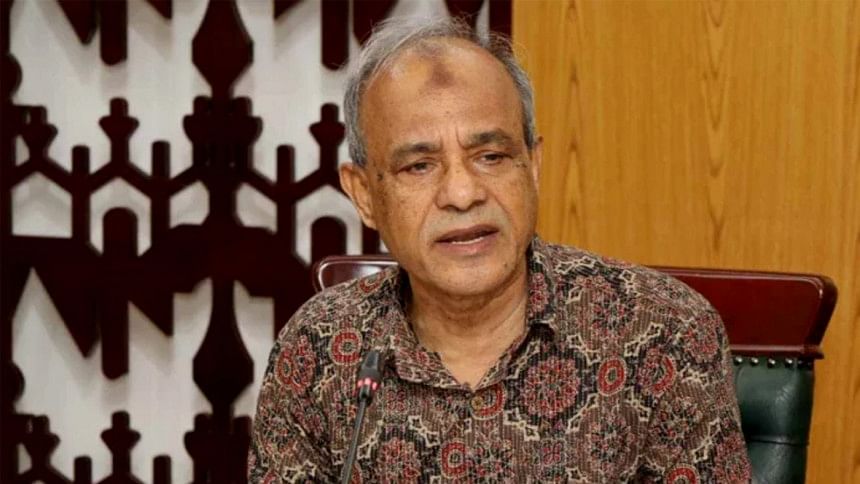Operation to go on until all 'devils' rooted out

Joint forces detained 1,308 people across the country between Saturday evening, when Operation Devil Hunt began, and yesterday afternoon.
The interim government launched the operation on Saturday to restore law and order following Friday night's attack on "students and people" in Gazipur.
The operation will continue until all the "devils are rooted out", said Home Adviser Lt Gen (retd) Jahangir Alam Chowdhury yesterday.
When asked about the objective of the operation, Jahangir said, "What does 'devil' mean? It refers to evil forces. The operation will target those who attempt to destabilise the country, break the law, and engage in criminal activities."
The operation will target those who attempt to destabilise the country, break the law, and engage in criminal activities.
During a briefing on the operation yesterday afternoon, Nasimul Ghani, senior secretary at the home ministry, said, "This is a police-led operation, with the army and other forces providing assistance."
"They [the joint forces] will have the same authority as the police and magistrates within the legal framework. The operation began yesterday [Saturday] and will continue for as long as necessary," he said.
The government yesterday evening launched a central command centre for the operation, said Chief Adviser's Press Secretary Shafiqul Alam, adding that the command centre would include the members of the police, Border Guard Bangladesh (BGB), Rapid Action Battalion (Rab), and the armed forces.
"We hope this initiative will further improve law and order in Bangladesh, allowing quick response in any area … ," he added.
WHO ARE BEING HELD?
Analysing reports from some districts, this newspaper found that the arrestees are mostly members of the Awami League and its associate bodies.
Many of them are accused in cases filed after the fall of the Sheikh Hasina-led government on August 5.
For instance, joint forces raided Hatia of Noakhali and arrested seven AL men, including a former union council chairman, on Saturday night.
Officer-in-Charge AKM Ajmal Huda of Hatia Police Station told The Daily Star that the operation involved members of the navy, the coast guard, naval police, and Hatia Police Station.
The Chattogram Metropolitan Police held 19 leaders and activists of the AL, Jubo League, and the banned Chhatra League.
Law enforcement agencies also detained four AL members from different upazilas in Rajshahi as part of Operation Devil Hunt, said Rajshahi Additional Police Superintendent Rafiqul Alam.
In Kushtia, 13 individuals, all leaders and activists of the AL and its associated bodies, were detained between Saturday night and yesterday afternoon.
In Khagrachhari, police held four activists of the banned Bangladesh Chhatra League in Guimara upazila, said OC Enamul Haque Chowdhury of Guimara Police Station.
WHY THE OPERATION?
Briefing reporters at the home ministry, Senior Secretary Nasimul said the army was deployed after the fall of the autocratic regime amid an uprising. During that time, the police force suffered significant blows, institutionally, and psychologically. Many police stations were burnt down. This necessitated the continued deployment of the army under the "In Aid to Civil Power" provision, he said.
"In response to the situation, we devised multiple strategies. Some [measures] are already in place, while other initiatives are being implemented. Operation Devil Hunt is one of them," he added.
About the name of the operation, he said, "Every operation has a code name to maintain focus."
The home secretary said that the objective of the operation is to apprehend those attempting to destabilise the country and bring them to book.
On Saturday, Gazipur Metropolitan Police Commissioner Nazmul Karim Khan said, "Operation Devil Hunt will be conducted to combat Awami fascism."
Asked whether individuals accused in cases filed after August 5 would be the target of the operation, Nasimul said, "You will know when the police take action."
He said law enforcement cannot be carried out in the same manner as before. "We must uphold the spirit of the law. Our goal is to establish a better system, keeping human rights and environmental concerns in mind. We don't want to create another 'Aynaghar'. Instead, we want to leave behind a better environment for the future."
A workshop focusing on human rights and environmental concerns will be held tomorrow where 150 police officials from Dhaka and Gazipur will take part, he said.
When asked why people still feel insecure even six months after the uprising, Nasimul said, "In countries where there have been revolutions, the defeated forces are not allowed to stay. But we could not be that inhumane. Some officers engaged in wrongdoings out of fear and pressure, while die-hard loyalists of the previous regime have fled. Actions are being taken against them."
He said police morale has been significantly damaged. "We are making a sincere effort to bring about genuine reform in the police. That's why they are being actively counselled," he added.
After the fall of the Hasina-led regime, mobs looted firearms and bullets from different police stations across the country.
Joint forces, comprising the armed forces, BGB, coast guards, Police, Rab, and Ansar, were deployed on September 4 to recover firearms and maintain law and order.
On September 17, the interim government gave the power of magistracy to commissioned army officers.

 For all latest news, follow The Daily Star's Google News channel.
For all latest news, follow The Daily Star's Google News channel. 








Comments